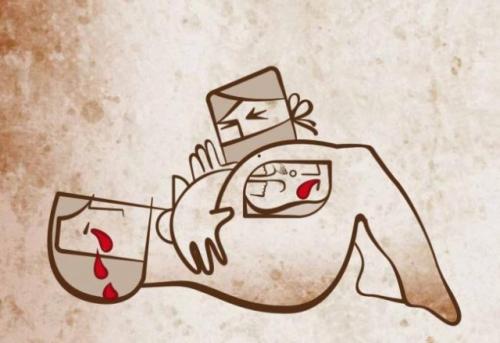El Parto es Nuestro (Birth is ours) presents the final report of the campaign "Stop Kristeller: a matter of gravity"*
Press release 2014/02
Wednesday, 25th June 2014
With the purposes of creating a conscience amongst women and healthcare professionals about the dangers of the Kristeller manoeuvre and of promoting its eradication, the campaign has collected data of 373 births to draw the map of the impact in Spain of this invisible manoeuvre, which may cause serious injuries to both mother and baby.

[Image 1: logo of the campaign "STOP Kristeller: a matter of gravity"]
El parto es nuestro (Birth is ours), a non-profit association formed by families and professionals which pursues to improve the assistance conditions for mothers and children during pregnancy, birth and postpartum in Spain, now presents the final report of the campaign "Stop Kristeller: a matter of gravity"*, whose goal is to inform about this manoeuvre so as to contribute to its eradication.
The Kristeller manoeuvre or uterine fundal pressure consists on pressing the woman's womb with the hands or the forearm, so as to accelerate the expulsion. There is usually no proof of such manoeuvre on the women's medical record (hence the name "invisible manoeuvre") and frequently women are neither informed nor asked for consent before its practice. It is a common and a popular intervention in Spanish hospitals, which has negative effects on both mother and baby, and according to the WHO (which advises against it), it is not supported by scientific evidence, which has led to its prohibition in the United Kingdom.
In Spain, both the Ministry of Health and the Spanish Society of Ginecology and Obstetrics (SEGO) advise against the use of the Kristeller manoeuvre. In 2010 the Ministry estimated its use in at least 26% of births.
These are the main conclusions of the campaign:
- 93,5% of the interviewed women were not previously informed about the Kristeller manoeuvre before its practice.
- On 96,2% of the interviewed women the manoeuvre was practiced without consent. These two facts constitute flagrant vulnerations of the Patient's autonomy Act of 2002.
- 75,3% of the interviewed women consider that the manoeuvre was not positive and 47,1% state that it did not help accelerate birth.
- It involves a great deal of physical violence, because in 30% of the studied cases the pressure was repeatedly executed (four times or over) with the arms and all the weight of the professional's body on the woman's womb, causing immediate pain in 55,9% of the studied cases.
- Although 39,1% of the interviewed women asked the professional to stop, in 90% of these cases the manoeuvre was executed anyway.
- In 70% of the studied cases other interventions were necessary: ventose (22,65%), forceps (18,82%) and cesarean section (6,76%).
- 61% of the interviewed women had an episiotomy, 30% from which suffered also from a vaginal tearing (from which 16% were first degree tears and 7% were second and third degree tears).
- 59,4% had physical injuries: second and third degree tearing (40,31%); backache (14,8%); haematoma (12,24%); fractured ribs (4,59%); uterine prolapse (3,06%); placenta abruptio (2,04%).
- 31,2% of the studied cases needed further medical treatment.
- 26,5% of the babies suffered various injuries: breathing difficulty (40%); fractured clavicle (17,78%); haematoma (15,56%); muscular strain and brain trauma (6,7%); internal organs injury and hypoxia (4,4%); Erb paralysis and fractured humerus (2,2%).
- 63,5% of the interviewed women adduce emotional consequences and consider that it was a traumatic experience for their babies, their partners and themselves.

* In fact, such slogan is a game of words, because in Spanish "gravedad" means both "gravity" and "seriousness, relevance", so "cuestión de gravedad" can be translated either as "a matter of gravity" or "a serious matter".
For further information:
Web: Campaign “Stop Kristeller: cuestión de gravedad”
Lara Willmott
kristeller@elpartoesnuestro.es
Tlf: 670 574 070

